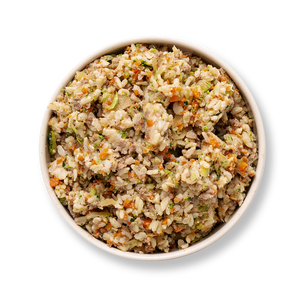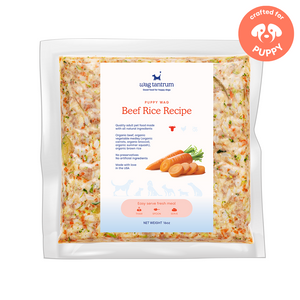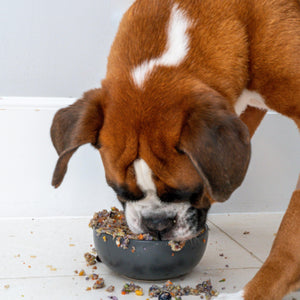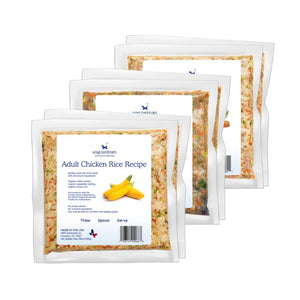4 Reasons Your Dog Is a Picky Eater & What To Do About It
Like us humans, dogs love a hearty meal and tasty snacks. Consistent meals substantially impact how dogs get the energy they need to run around every day and develop into a strong, healthy pooch.
Unfortunately, some pet owners find themselves with a picky pup who isn’t eating meals as consistently as they should. If you’re wondering why your dog isn’t eating, we will help you tackle the issue with more clarity. Read the list below to discover the potential reasons your dog is a picky eater and what to do about it.
Health & Dietary Issues
One of the most common reasons for picky eating in dogs is a health or diet-related issue. Like humans, dogs require a nutritionally balanced diet every day to grow and remain healthy. For instance, our dog meal plan delivery options use organic ingredients to meet your dog’s taste preferences and nutritional needs.
From obesity to pancreatitis, dogs can develop various illnesses due to a poor diet. Some illnesses are hard to identify, but one strong piece of evidence is loss of appetite. Maybe your dog has a stomachache, or maybe it’s a more serious condition.
So, how do you know? If your dog skips one meal, it isn’t the end of the world. That said, your dog refusing to eat for a day is a clear sign something isn’t right. The best way to find a resolution in these circumstances is to visit your veterinarian to discuss possible food allergies and other ailments that might be the cause.
If your dog shows more severe signs of illness such as vomiting, bring them to your vet immediately. Since dogs can’t speak, communicating illnesses is far from easy. Thus, knowing the signs and acting swiftly when they arise is critical for every pet owner. Illness is a common culprit, but it’s not the only cause of appetite issues in pups. Next, we’ll discuss how poor eating habits can result from a visit to the vet.
New Medications
When considering the reasons your dog is a picky eater and what to do about it, always think about medications. If your dog isn’t on medication, then that’s easy—that’s not the culprit. However, if your dog is on a new medicine, there’s a significant chance that’s the culprit behind your pup’s eating habits.
rel="nofollow"That said, if you think medication is a cause of the titular problem, schedule an appointment with your veterinarian as soon as possible. Your vet should thoroughly understand your dog’s unique medical conditions, so they will help you find a solution that fits your pet’s needs precisely.
That might sound straightforward to some, but it’s essential to understand that, although picky eating is a common reaction, each situation has its own set of unique factors to consider. From the specific medication to the dog’s diet, the various variables can differ. Speaking of the dog’s diet, let’s dive deeper into how that can impact their picky eating habits.
Snack Time Overshadows Mealtime
Do you feed the dog your table scraps or toss them a treat a bit too frequently? If the answer is yes, you might be spoiling their appetite. Relating dog diets to human diets is something you’ll see a lot in this list because it perfectly contextualizes the importance of certain steps.
For instance, watching your pup bounce with joy when you break out snacks is wonderful, so you might feel the need to do it more often than necessary. The same principle applies to sending your table scraps to the pup eagerly waiting at your feet.
Although these actions might feel fun, they can overshadow mealtime. Remember, eating a donut can be a tasty treat with morning coffee, but overindulging too much in the early afternoon will likely mean you’re not hungry around lunchtime.
This is a common occurrence that is easily avoidable by simply taking control. Keep treats a specific ritual, whether it’s tossing the dog a treat after every walk or bathroom break—whatever works best for your dog’s habits. However, hand out snacks in moderation to ensure the pup’s appetite is ready when mealtime arrives.
So, what should you do if you’re not an excessively generous snack- or scraps-giver? In this case, it might have less to do with a lack of meals and more about the quality. Let’s break down how your dog’s palate might be at the center of their eating issues.
They Don’t Like the Food
Not only can tasty treats deter your dog’s appetite around mealtime, but so can the quality of the ingredients. Simply put, sometimes, your dog might not enjoy the food you’re serving. Like human food, dog food varies in quality, both in flavor and health attributes.
If you’re serving your pooch meals with low-quality ingredients, consider upgrading to a better option. Likewise, don’t forget that dog food has an expiration date, so your pup’s disinterest might simply be due to a lack of fresh food.
However, transitioning meals for dogs takes time and precision, so consult your vet to ensure you can find a match for your dog’s specific needs. Transitioning to a new meal tends to be a week-long process. Typically, you should start with a bowl quarter-filled with new ingredients and 75 percent of the old ingredients. The next day, you can increase to 40 percent new ingredients.
Then, day three will be the day you upgrade to 50 percent both new and old ingredients. After day three, add 15 perfect new ingredients each day until the whole bowl is new food. That said, switching dog foods does require careful monitoring of your pet after the transition. If you notice the new food is making your dog sick or disinterested, partner with your vet to find the right course correction.
Now that you’re more familiar with the top reasons dogs become picky eaters, finding the right solution should feel less daunting. A dog refusing to eat can be stressful for the owner. However, it’s important to remember that just as there are many reasons behind the behavior, there are simple solutions, too.









